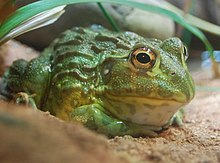The Pyxicephalidae are a family of frogs currently found in sub-Saharan Africa.[1][2] However, in the Eocene, the taxon Thaumastosaurus lived in Europe.[3]
| Pyxicephalidae Temporal range:
| |
|---|---|

| |
| Pyxicephalus adspersus | |
| Scientific classification | |
| Domain: | Eukaryota |
| Kingdom: | Animalia |
| Phylum: | Chordata |
| Class: | Amphibia |
| Order: | Anura |
| Clade: | Ranoidea |
| Family: | Pyxicephalidae Bonaparte, 1850 |
| Subfamilies | |
| |
Classification
editThe Pyxicephalidae contain two subfamilies, with a total of 12 genera.[1][2] This family was formerly considered part of the family Ranidae.[1]
Family Pyxicephalidae
- Subfamily Cacosterninae[4]
- Genus Amietia (16 species)
- Genus Anhydrophryne (3 species)
- Genus Arthroleptella (10 species) – moss frogs
- Genus Cacosternum (16 species)
- Genus Microbatrachella (monotypic) – micro frog
- Genus Natalobatrachus (monotypic)
- Genus Nothophryne (5 species) – mongrel frogs
- Genus Poyntonia (monotypic)
- Genus Strongylopus (10 species)
- Genus Tomopterna (16 species)
- Subfamily Pyxicephalinae[5]
- Genus Aubria (2 species) – Masako fishing frog, brown ball frog
- Genus Pyxicephalus (4 species) – African bull frogs, pixie frog
- Genus †Thaumastosaurus (3-5 species) – western Europe, Eocene (extinct)
References
edit- ^ a b c Frost, Darrel R. (2014). "Pyxicephalidae Bonaparte, 1850". Amphibian Species of the World: an Online Reference. Version 6.0. American Museum of Natural History. Retrieved 3 May 2014.
- ^ a b "Pyxicephalidae". AmphibiaWeb: Information on amphibian biology and conservation. [web application]. Berkeley, California: AmphibiaWeb. 2014. Retrieved 3 May 2014.
- ^ Lemierre, Alfred; Folie, Annelise; Bailon, Salvador; Robin, Ninon; Laurin, Michel (4 May 2021). "From toad to frog, a CT-based reconsideration of Bufo servatus, an Eocene anuran mummy from Quercy (France)". Journal of Vertebrate Paleontology. 41 (3): e1989694. Bibcode:2021JVPal..41E9694L. doi:10.1080/02724634.2021.1989694. ISSN 0272-4634. S2CID 244552296.
- ^ Frost, Darrel R. (2014). "Cacosterninae Noble, 1931". Amphibian Species of the World: an Online Reference. Version 6.0. American Museum of Natural History. Retrieved 3 May 2014.
- ^ Frost, Darrel R. (2014). "Pyxicephalinae Bonaparte, 1850". Amphibian Species of the World: an Online Reference. Version 6.0. American Museum of Natural History. Retrieved 3 May 2014.